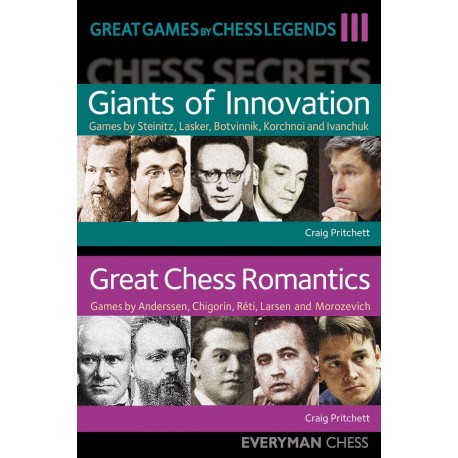No products
Craig Pritchett - Great Games by Chess Legends, Vol. 3 (K-5687)
K-5687
New product
Chess Secrets is a series of books which uncover the mysteries of the most important aspects of chess, such as strategy, attack, defence, opening play, endgames, off-board preparation and mental attitude. In each book the author chooses and deeply studies a number of great players who have excelled in such aspects of the game, greatly influenced their peers and inspired all of us.
- Write a review
Data sheet
| Language versions | English |
| Available in the set | Yes |
| Series | Chess Secrets |
| Author / Authors | Craig Pritchett |
| Publisher | Everyman Chess |
| Year of Publication | 1st edition 2018 |
| Pages | 608 |
| ISBN | 9781781944714 |
| Hardcover | No |
| Paperback | Yes |
| Downloadable | No |
| Width | 15.4 cm |
| Height | 22.9 cm |
More info
In Giants of Innovation, Craig Pritchett selects five chess legends whose play exemplifies outstandingly innovative attributes. Wilhelm Steinitz established the essential ground-rules for modern positional chess. Emanuel Lasker pioneered a new kind of total all-out battling chess. Mikhail Botvinnik taught us how to prepare and successfully play an entire range of complex modern opening systems. Viktor Korchnoi set particularly high standards in the art of defence and counter-attack. Vassily Ivanchuk, a modern byword for ingenuity and surprise, excels by constant creation.
In Great Chess Romantics, Craig Pritchett selects five players, whose chess artistry expresses a deeply personal commitment to the discovery and revelation of great new truths and beauty on the chessboard. Anderssen defined romanticism's inherently dramatic and correct combinational core. Chigorin championed this essence in splendid opposition to an emerging new classical consensus. Réti revealed the extraordinary power of new flank openings. Larsen confounded the overly sober, scientific Soviet school'cc at innumerable turns. In the computer age, Morozevich constantly discovers new depths to chess, while simply oozing exquisite strokes in his best games.
Reviews






